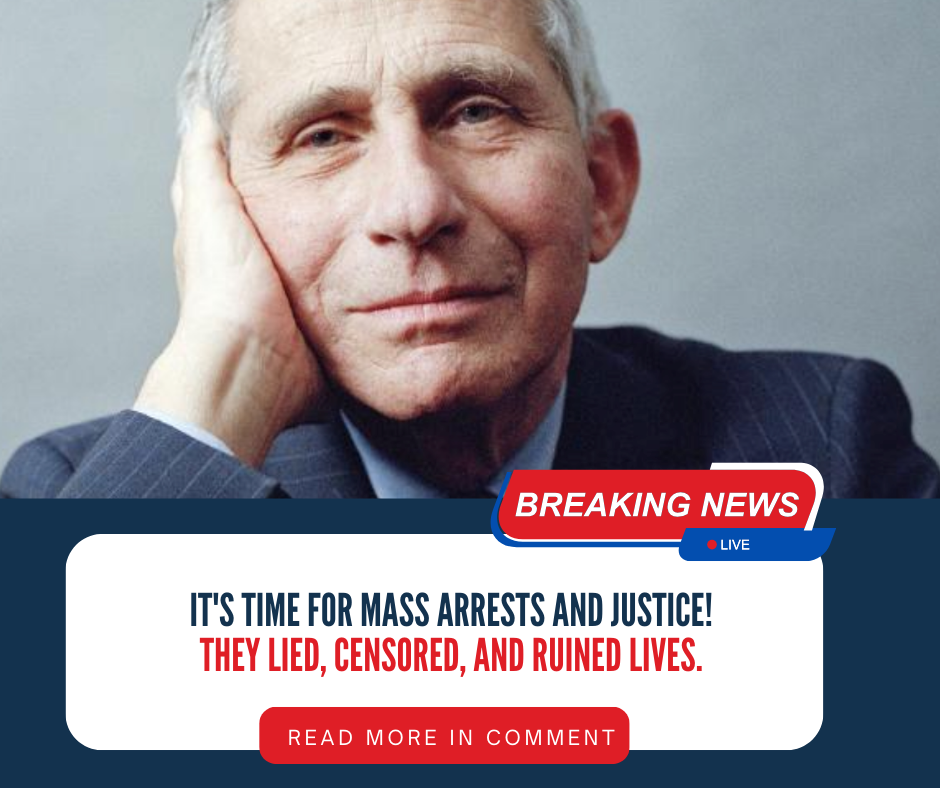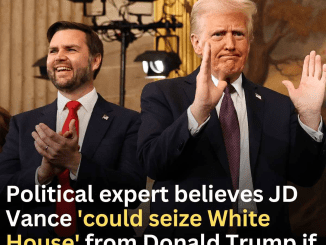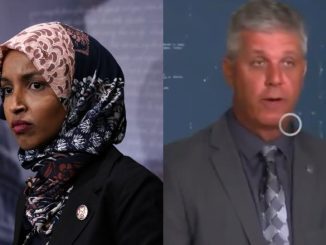A Historic Announcement
On April 18, 2025, the Trump administration made a bold declaration that has reverberated across the globe: the White House officially confirmed that COVID-19 originated from a lab leak at the Wuhan Institute of Virology in China. This statement, published on the revamped COVID.gov website, marks a significant shift in the U.S. government’s stance on the pandemic’s origins, which claimed over 1.1 million American lives and disrupted the world for years. More strikingly, the announcement accuses Dr. Anthony Fauci, EcoHealth Alliance President Dr. Peter Daszak, and officials at the National Institutes of Health (NIH) of a deliberate cover-up, obstruction, and criminal deception, alleging they misled the public and suppressed the lab leak theory to protect their own interests.

This confirmation aligns with a January 2025 CIA assessment, which concluded with “low confidence” that the virus likely escaped from a lab, and a December 2024 congressional report that reached similar findings. However, the White House’s pointed accusations against Fauci, Daszak, and the NIH have intensified an already polarized debate, raising questions about accountability, transparency, and the future of global health security. As we unpack this moment, we must prioritize facts over rhetoric, seeking a path forward that rebuilds trust and prevents future crises.
The White House’s Claims: A Closer Look
The updated COVID.gov page, titled “Lab Leak: The True Origins of COVID-19,” presents a detailed case for the lab leak theory. It alleges that the Wuhan Institute of Virology, partially funded by the NIH, conducted dangerous gain-of-function research—experiments that enhance a virus’s transmissibility or lethality—leading to the accidental release of SARS-CoV-2. The White House claims EcoHealth Alliance, under Daszak’s leadership, facilitated this research using U.S. taxpayer dollars, violating NIH grant terms. This led to the Department of Health and Human Services suspending EcoHealth’s funding and initiating debarment proceedings, as noted by Newsweek.
The website further accuses Fauci of orchestrating a cover-up by prompting the 2020 publication “The Proximal Origin of SARS-CoV-2,” which argued for a natural origin and was used to discredit the lab leak theory. It claims Fauci’s senior advisor, Dr. David Morens, obstructed congressional investigations by deleting records, lying to Congress, and sharing nonpublic NIH grant information with Daszak, who also allegedly provided false statements and doctored documents. The White House also criticizes the Biden administration for delaying and obstructing investigations, alleging a multi-year campaign to hide incriminating evidence.

Contextualizing the Allegations
The lab leak theory has been debated since the pandemic’s onset, splitting experts between a natural zoonotic origin—potentially from a Wuhan wet market—and a lab escape. Early on, the theory was dismissed by many scientists and officials, partly due to Fauci’s influence and the “Proximal Origin” paper, which shaped public discourse. However, a December 2024 congressional report concluded the virus likely leaked from a Wuhan lab, citing EcoHealth’s role in risky research and Daszak’s lack of transparency with investigators. The report also noted the Department of Justice’s ongoing investigation into EcoHealth’s activities.
The CIA’s January 2025 assessment, ordered by the Biden administration and released under new director John Ratcliffe, added weight to the lab leak theory, though with “low confidence” due to a lack of new evidence and Chinese non-cooperation, per CBS News. This uncertainty underscores a critical challenge: without definitive proof, the debate risks becoming a political lightning rod rather than a scientific inquiry. The White House’s accusations, while serious, rely on existing data and congressional findings, raising questions about their timing and intent, especially given Trump’s long-standing criticism of Fauci, who was pardoned by Biden to shield him from potential legal attacks, as reported by The Guardian.
Public Reaction and the Trust Deficit
Public sentiment, as reflected in posts on X, is deeply divided. Some users hail the White House’s confirmation as vindication, accusing Fauci and the NIH of corruption and celebrating Trump’s transparency. Others question the motives, noting the lack of new evidence and the political context of Trump’s feud with Fauci, who clashed with him during the pandemic and faced death threats, per France24. This polarization mirrors broader distrust in institutions, exacerbated by the pandemic’s mishandling—conflicting mask guidance, social distancing rules, and suppression of alternative theories like the lab leak, which the White House now claims were demonized to control public health decisions.
The White House’s decision to replace COVID.gov—once a resource for health guidance—with a lab leak exposé has amplified these tensions. Critics argue it prioritizes narrative over utility, while supporters see it as a necessary reckoning. Regardless, the move underscores a profound trust deficit: after years of uncertainty, Americans deserve clarity, not just accusations.
A Balanced Perspective
The allegations against Fauci, Daszak, and the NIH are grave and warrant thorough investigation. Fauci, a polarizing figure who led the U.S. COVID-19 response, has denied suppressing the lab leak theory, testifying in 2024 that he supported a natural origin based on scientific consensus at the time, per Axios. Daszak and EcoHealth have faced scrutiny since 2020 for their Wuhan research, with congressional findings suggesting they misled investigators—a serious charge if proven. The NIH’s role, particularly its funding of gain-of-function research, raises legitimate questions about oversight and risk management.
However, the White House’s narrative must be scrutinized as critically as the actions it condemns. The lack of new evidence in the CIA assessment and the timing of the announcement—amid Trump’s appointment of lab leak proponents like Robert F. Kennedy Jr. and Dr. Jay Bhattacharya to health roles—suggest political motivations may be at play. Fauci’s pardon by Biden, while protective, fuels perceptions of a cover-up, yet it also reflects the intense political pressure he faced. The truth lies in the evidence, not the rhetoric, and all parties must be held to the same standard of accountability.
A Call for Independent Investigation
To move forward, we must prioritize transparency and impartiality. The allegations of cover-up and obstruction demand a comprehensive, independent investigation—one free from political influence, whether from the Trump administration or its predecessors. This inquiry should:
- Examine NIH Funding: Investigate the NIH’s role in funding gain-of-function research at the Wuhan Institute of Virology, assessing whether proper safeguards were in place and if EcoHealth violated grant terms.
- Review Fauci and Morens’s Actions: Scrutinize claims that Fauci orchestrated a cover-up via the “Proximal Origin” paper and that Morens obstructed investigations, ensuring due process for all involved.
- Assess EcoHealth and Daszak: Probe Daszak’s alleged deception, including false statements and document tampering, to determine the extent of EcoHealth’s responsibility.
- Demand Chinese Cooperation: Press China for access to Wuhan lab records, early case data, and researcher interviews, as the lack of transparency hinders resolution, per The Guardian.
This investigation should be led by an international panel of scientists, legal experts, and ethicists, with findings made public to rebuild trust. The Department of Justice’s ongoing probe into EcoHealth is a start, but broader accountability is needed.
Lessons for the Future
The White House confirmation, while contentious, offers an opportunity to learn and prevent future pandemics. First, global health research must prioritize safety, with stricter oversight of gain-of-function studies. The NIH’s funding of such research, as noted by The New York Times, highlights the need for clear guidelines and risk assessments. Second, public health communication must be transparent and adaptable—conflicting guidance on masks and distancing eroded trust, a point the White House now leverages to critique Fauci’s leadership. Third, governments must foster open scientific debate, ensuring theories like the lab leak are investigated, not suppressed, as alleged during the Biden administration.
Finally, international cooperation is critical. The Chinese government’s refusal to share data, as noted by the CIA, has prolonged uncertainty. A global framework for pandemic preparedness—enforcing transparency, sharing early data, and regulating high-risk research—can mitigate future risks.
Engaging the Public
The American public, having endured the pandemic’s toll, deserves a voice in this process. We encourage citizens to:
- Demand Accountability: Contact elected officials to support an independent investigation into COVID-19’s origins and the alleged cover-up.
- Stay Informed: Follow updates from credible sources, avoiding misinformation that fuels division.
- Advocate for Reform: Push for policies that enhance biosafety, transparency, and global cooperation in health research.
By engaging constructively, we can turn this moment of reckoning into a catalyst for change, ensuring that science serves humanity without risking catastrophe.
Moving Forward
The White House’s confirmation of a lab leak origin for COVID-19, coupled with accusations against Fauci, Daszak, EcoHealth, and the NIH, marks a pivotal moment in the pandemic’s aftermath. While the claims are serious, they must be met with rigorous, impartial scrutiny—not political agendas. The truth about COVID-19’s origins may never be fully resolved without Chinese cooperation, but we can still pursue justice, transparency, and reform.
As we navigate this chapter, let’s commit to a future where public health is grounded in trust, where high-risk research is responsibly managed, and where governments prioritize people over narratives. The lessons of COVID-19 must guide us, ensuring that history does not repeat itself.
Join the Call for Truth
To learn more or get involved, visit whitehouse.gov for the full statement, or contact your representatives to advocate for an independent investigation. Together, we can demand the transparency and accountability that Americans—and the world—deserve.


